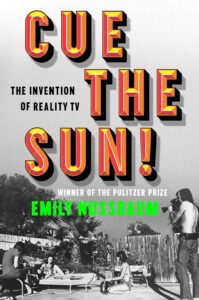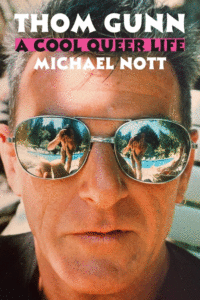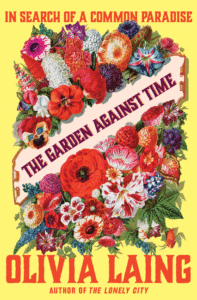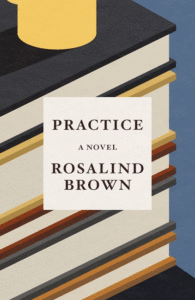Article continues below
Our five-alarm fire of fabulous reviews this week includes Patrick Cottrell on Tracy O’Neill’s Woman of Interest, Phillip Maciak on Emily Nussbaum’s Cue the Sun, Anthony Domestico on Michael Nott’s Thom Gunn: A Cool Queer Life, Lauren LeBlanc on Olivia Laing’s The Garden Against Time, and Meara Sharma on Rosalind Brown’s Practice.
Brought to you by Book Marks, Lit Hub’s home for book reviews.
*

“O’Neill elevates the subgenre, producing a memoir that is simultaneously an investigation, a noir with a femme fatale, and a darkly humorous tale of what happens when one meets the person who has everything and nothing to do with one’s life. Woman of Interest is searching, yes, but more attuned to language and paranoia than others of its genre … Although O’Neill’s memoir is essentially concerned with her mother in Korea, the titular woman of interest, we also get a sense of the other mother in a gorgeously melancholic recounting of O’Neill’s upbringing by her adoptive family in New England … Instead of the reparative gestures of a traditional adoptee memoir, Woman of Interest offers something darker, colder, more fraught, and ultimately, singular and transcendent.”
–Patrick Cottrell on Tracy O’Neill’s Woman of Interest: A Memoir (BOMB)

“Tracking the development of reality TV as a genre from the early hidden-camera shows of the 1950s to the sprawling empires of today, the book gives us glimpses into the fraught production of these shows, their divided receptions, and the melancholy biographies of some of the thousands of people who have appeared on these shows only to emerge as strange, fractured mutant versions of themselves, no longer TV characters, but certainly no longer the people they were before. Nussbaum has spent much of her career arguing for the importance and seriousness of television, even its status as an art form.
Reality TV puts her thesis to the test: Sure, The Sopranos is art, but Real Housewives? It’s an old argument, even a tired one, but that doesn’t mean it isn’t still happening. Nussbaum, as always, makes her case for the seriousness of her subject simply by taking it seriously. Attentive not just to the cultural footprint of the reality show but to its ticky-tacky specificity, Cue the Sun! provides a sometimes grim, occasionally gleeful account of the way that television can not just mirror but also create real life … The story she tells in Cue the Sun! is one of lofty cinematic ambitions compromised by way of hundreds of incremental slippages and brazen betrayals over a period of generations. Alternately craven and credulous, the accumulated acts through which documentary, as a form, came to be ‘dirtied’ in this way amount to a gripping tale of decadence and decay. A rise and a decline all at once.”
–Phillip Maciak on Emily Nussbaum’s Cue the Sun: The Invention of Reality TV (The New Republic)

“Thom Gunn was the great rhapsode of risk. In a 1961 love letter to queer San Francisco, the poem’s speaker looks from afar at the drunken revelers and hungry cruisers in the darkened streets below: ‘By the recurrent lights I see / Endless potentiality, / The crowded, broken, and unfinished! / I would not have the risk diminished’ … And yet, even while he loved the vertiginous experience of risk, Gunn loved the equanimity of balance equally. Though he wrote about hot things—sex, drugs, ecstasy of all kinds—his style was one of controlled coolness … Touch is required of both the lover and poet. It’s where risk and balance, sex and poetry, come together. Touch is also required of the biographer. Gunn knew this—and he knew that not all biographers possessed the required gift.
Lucky for him, Gunn’s own biographer, Michael Nott, has the gift. The virtues of Thom Gunn: A Cool Queer Life are many: a total command of Gunn’s life; a clear, though hardly idolatrous, affection for its subject; and a true critic’s touch. Nott manages to sculpt his voluminous material—the book checks in at over seven hundred pages—into a compelling life … Despite these mournful bookends, Nott shows that Gunn’s life was constituted in large part by improvisation and daring: improvisation necessitated by suffering and a liberatory impulse grounded in a series of lasting commitments.”
–Anthony Domestico on Michael Nott’s Thom Gunn: A Cool Queer Life (The Baffler)

“Gardening is an immediate way of not only leaving an indelible mark on a residence, but on yourself as well. One uncovers dignity in the dirt through the act of leaving something better than it was when you found it. For Laing, who lived a largely peripatetic life until her 40s, gardens were ‘a way of making myself at home’ wherever she lived. She explores these themes through deft research and her own experience in this enchanting and rambling book … beyond an examination of gardens proverbially fertilized by the blood, sweat, and tears of others, Laing considers the loftier aspiration of gardens as paradise.
Naturally she lands upon Eden, the first and idealized garden to which many, as those who carry the legacy of expulsion, aspire to return … Laing maps the ghosts of gardens and sacred spaces destroyed through war … What makes this captivating book more than an elaborate journal of gardening and its fraught history is Laing’s insistence on Jarman’s idea that ‘paradise haunts gardens’ … It’s up to gardeners, working with the fragile world we inhabit, to apply ourselves to work worthy of utopia, even if it may all end in ashes.”
–Lauren LeBlanc on Olivia Laing’s The Garden Against Time: In Search of a Common Paradise (The Boston Globe)

“Such asides, rendered as they are in Brown’s austere yet rigorously observant prose, represent the real delights of Practice. Because, in lieu of producing an essay about Shakespeare’s poems, everything—literally everything—is imbued with the poetry’s distilled, percipient quality. The book makes the case that a particular kind of mindfulness is to be found in the space of possibility that precedes writing, the mode of wanting-to-write—to the extent that that its fizzing latency becomes its own vivid and extra sensitive orientation on the world, its own vital way of being. …
Practice beautifully illustrates a tension at the heart of not just loving reading but loving writ large. At the beginning, we all want to ‘be the poem.’ And to some extent, we are what we read, we are who and what we’ve loved—they all leave their marks, their various inscriptions. But also, we are not what we’ve read or loved. We are who we are, and a text or person or object is a text or person or object. The paradox is imbued with aching desire—don’t we all want we can’t quite reach?”
–Meara Sharma on Rosalind Brown’s Practice (Los Angeles Review of Books)
